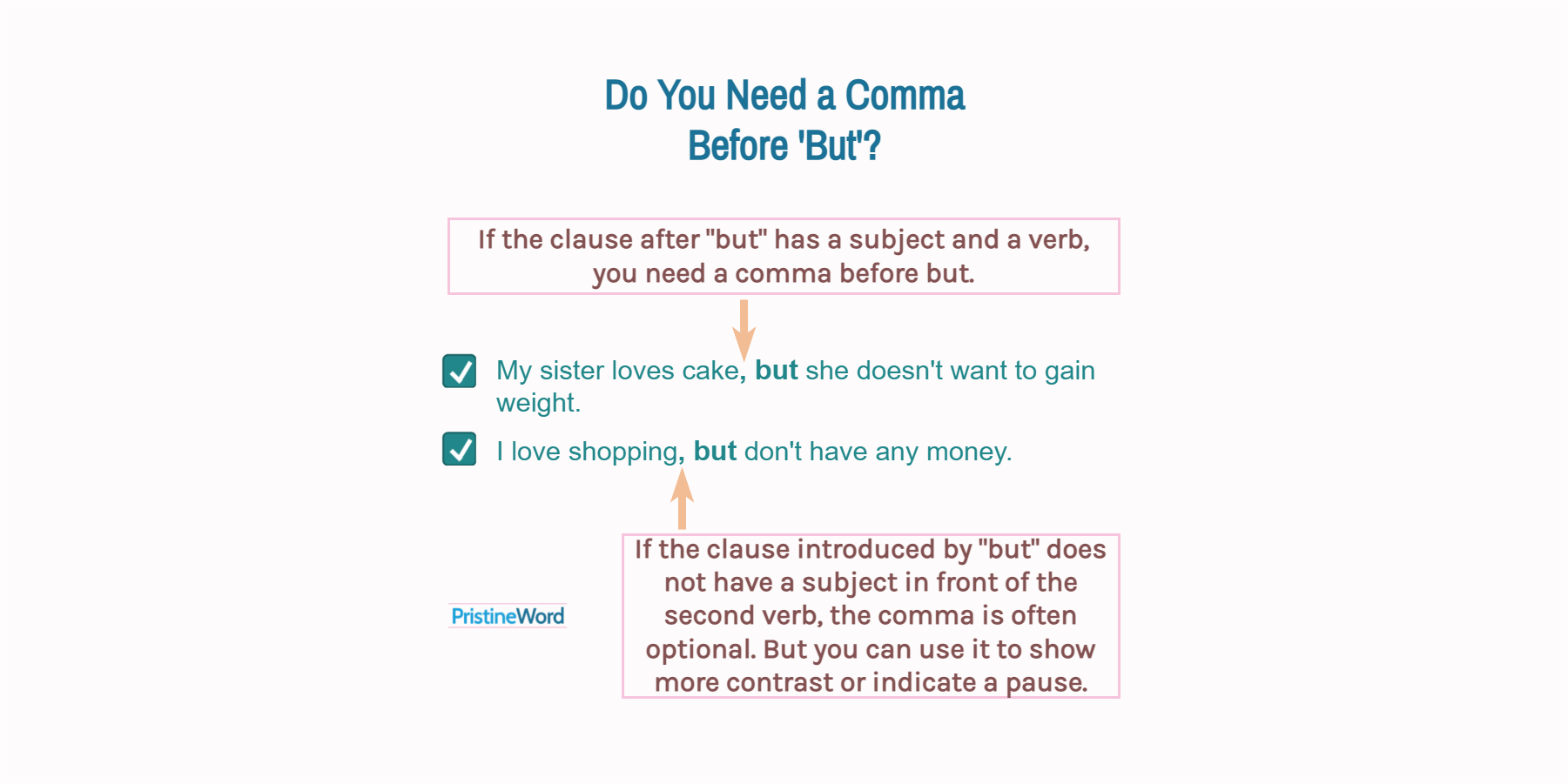If the clause after "but" has a subject and a verb, you need a comma before but. If the clause introduced by "but" does not have a subject in front of the second verb, the comma is often optional.
If the clause after "but" has a subject and a verb, you need a comma before but.
My sister loves cake, but she wants to avoid gaining weight.
My sister loves cake but she wants to avoid gaining weight.
If the clause introduced by "but" does not have a subject in front of the second verb, the comma is often optional. But you can use it to show more contrast or indicate a pause.
I love shopping but don't have any money.
I love shopping, but don't have any money.
Contents
1. Use a Comma to Introduce an Independent Clause
As a coordinating conjunction, but joins two clauses of a sentence. If the second clause can stand alone (it has a subject and a verb and forms a complete sentence), add a comma before but.
My brother loves watching TV, but he doesn't like reading.
My brother loves watching TV but he doesn't like reading.
Notice that both clauses on either side of the comma can stand alone.
Follow the same rules when using a comma before "and", "or", and other coordinating conjunctions such as "so", "for", "nor", or "yet".
My brother is an artist, and he loves painting.
My brother is an artist and he loves painting.
2. The Comma is Optional When Introducing a Dependent Clause
In some sentences, you don't need to repeat the subject after but because it is the same in both clauses.
I understand Spanish but cannot speak it.
In the example above, "cannot speak it" is not an independent clause—it cannot stand alone. An independent clause needs a subject and a verb. In this situation, the comma before "but" is optional.
I understand Spanish, but cannot speak it.
Some writers minimize punctuation usage, while others prefer to use more commas to give readers a chance to pause and take a breath.
The classic Blue Book of Grammar and Punctuation argues that using a comma is generally unnecessary when the subject does not appear in front of the second verb.
❝ If the subject does not appear in front of the second verb, a comma is generally unnecessary. Example: Morty thought quickly but still did not answer correctly.❞
Kaufman, Lester; Straus, Jane. The Blue Book of Grammar and Punctuation.
Other authors, however, recommend using a comma if the conjunction is but:
❝ When the subject is the same for both clauses and is expressed only once, a comma is useful if the connective is but. When the connective is and, the comma should be omitted if the relation between the two statements is close or immediate. ❞
Strunk JR., William; White, E.B. The Elements of Style.
As a general rule, you can choose whether to include a comma before but after considering a range of factors, including clarity, emphasis, and rhythm. In any case, add a comma if it makes the sentence clearer.
3. Other Rules for Placing a Comma Before 'But'
3.1 Use a comma if the clause does not limit or define
Insert a comma before "but" if the second clause does not limit or define; it merely adds something.(1)
For example:
It is not very common, but certainly possible.
By saying "it is not very common", you are already implying that it is possible. Therefore, the phrase "certainly possible" does not limit or define. It just adds information to the main part of the sentence.
3.2 Add commas to set off expressions that interrupts the sentence flow
Use commas to set off expressions that interrupts the flow of a sentence.(1)
I want to go, but not this year, to Italy.
I want to go but not this year to Italy.
3.3 Insert a comma before 'but' to separate contrasting parts of a sentence(1)
For example:
The money is in your wallet, but it's not yours.
4. More Examples
The second clause of these sentences are independent clauses; therefore, we place a comma before but:
- I tried to become a famous singer, but my father ruined it.
- It will be a painful process, but she has no other choice.
- I know it is expensive, but you have a lot of money.
- Yes, I know that you are tired, but you're not finished.
- It sounds really interesting, but I have decided that I must decline your offer.
- John learns fast, but his attention span is very short.
These are some examples where the comma before but is optional:
- Yes, I have a lot of money, but not for your crazy ideas.
- They are working slowly but surely.
- I bought the car but can't drive.
- Yes, I know that I am distracted, but cannot take my eyes off that girl when she’s talking.
- The food was good but not delicious.
- I would buy the red one but is too expensive.
5. Conclusion
Follow these guidelines to decide whether to use a comma before but:
- Include a comma before "but" to introduce an independent clause.
- If the subject does not appear in front of the second verb, the comma before "but" is optional.
6. References
(1) Kaufman, Lester; Straus, Jane. The Blue Book of Grammar and Punctuation. Chapter 2 (punctuation).
(2) Strunk JR., William; White, E.B. The Elements of Style.

